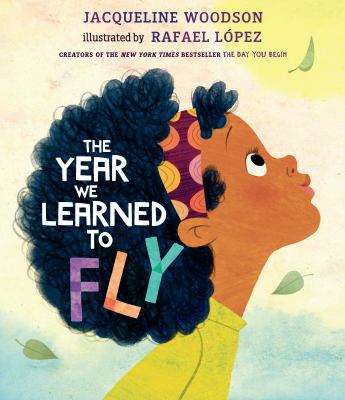About this item
On a dreary, stuck-inside kind of day, a brother and sister heed their grandmother's advice: "Use those beautiful and brilliant minds of yours. Lift your arms, close your eyes, take a deep breath, and believe in a thing. Somebody somewhere at some point was just as bored you are now." And before they know it, their imaginations lift them up and out of their boredom. Then, on a day full of quarrels, it's time for a trip outside their minds again, and they are able to leave their anger behind. This precious skill, their grandmother tells them, harkens back to the days long before they were born, when their ancestors showed the world the strength and resilience of their beautiful and brilliant minds. Jacqueline Woodson's lyrical text and Rafael Lopez's dazzling art celebrate the extraordinary ability to lift ourselves up and imagine a better world.
About the Author
Jacqueline Woodson
I used to say I'd be a teacher or a lawyer or a hairdresser when I grew up but even as I said these things, I knew what made me happiest was writing. I wrote on everything and everywhere. I remember my uncle catching me writing my name in graffiti on the side of a building. (It was not pretty for me when my mother found out. ) I wrote on paper bags and my shoes and denim binders. I chalked stories across sidewalks and penciled tiny tales in notebook margins. I loved and still love watching words flower into sentences and sentences blossom into stories. I also told a lot of stories as a child. Not "Once upon a time" stories but basically, outright lies. I loved lying and getting away with it! There was something about telling the lie-story and seeing your friends' eyes grow wide with wonder. Of course I got in trouble for lying but I didn't stop until fifth grade. That year, I wrote a story and my teacher said "This is really good. " Before that I had written a poem about Martin Luther King that was, I guess, so good no one believed I wrote it. After lots of brouhaha, it was believed finally that I had indeed penned the poem which went on to win me a Scrabble game and local acclaim. So by the time the story rolled around and the words "This is really good" came out of the otherwise down-turned lips of my fifth grade teacher, I was well on my way to understanding that a lie on the page was a whole different animal - one that won you prizes and got surly teachers to smile. A lie on the page meant lots of independent time to create your stories and the freedom to sit hunched over the pages of your notebook without people thinking you were strange. Lots and lots of books later, I am still surprised when I walk into a bookstore and see my name on a book's binder. Sometimes, when I'm sitting at my desk for long hours and nothing's coming to me, I remember my fifth grade teacher, the way her eyes lit up when she said "This is really good." The way, I - the skinny girl in the back of the classroom who was always getting into trouble for talking or missed homework assignments - sat up a little straighter, folded my hands on the desks, smiled and began to believe in me.
Report incorrect product information.



